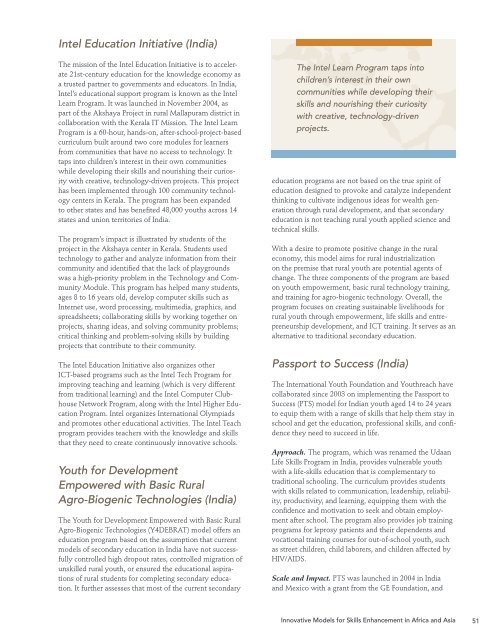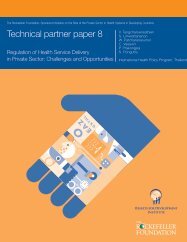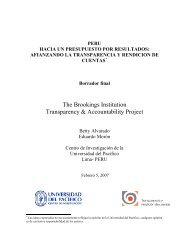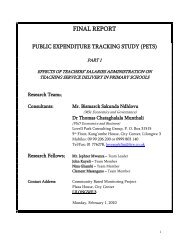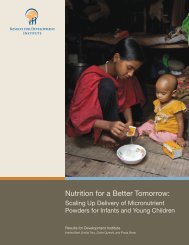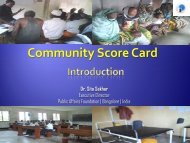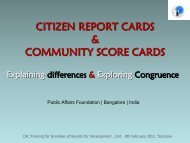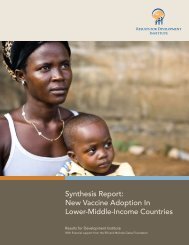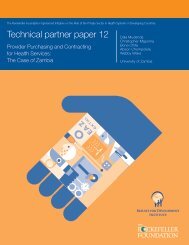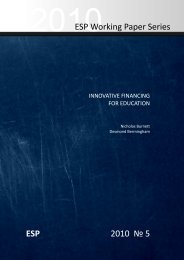Innovative Secondary Education For Skills Enhancement
Innovative Secondary Education For Skills Enhancement
Innovative Secondary Education For Skills Enhancement
Create successful ePaper yourself
Turn your PDF publications into a flip-book with our unique Google optimized e-Paper software.
Intel <strong>Education</strong> Initiative (India)<br />
The mission of the Intel <strong>Education</strong> Initiative is to accelerate<br />
21st-century education for the knowledge economy as<br />
a trusted partner to governments and educators. In India,<br />
Intel’s educational support program is known as the Intel<br />
Learn Program. It was launched in November 2004, as<br />
part of the Akshaya Project in rural Mallapuram district in<br />
collaboration with the Kerala IT Mission. The Intel Learn<br />
Program is a 60-hour, hands-on, after-school-project-based<br />
curriculum built around two core modules for learners<br />
from communities that have no access to technology. It<br />
taps into children’s interest in their own communities<br />
while developing their skills and nourishing their curiosity<br />
with creative, technology-driven projects. This project<br />
has been implemented through 100 community technology<br />
centers in Kerala. The program has been expanded<br />
to other states and has benefited 48,000 youths across 14<br />
states and union territories of India.<br />
The program’s impact is illustrated by students of the<br />
project in the Akshaya center in Kerala. Students used<br />
technology to gather and analyze information from their<br />
community and identified that the lack of playgrounds<br />
was a high-priority problem in the Technology and Community<br />
Module. This program has helped many students,<br />
ages 8 to 16 years old, develop computer skills such as<br />
Internet use, word processing, multimedia, graphics, and<br />
spreadsheets; collaborating skills by working together on<br />
projects, sharing ideas, and solving community problems;<br />
critical thinking and problem-solving skills by building<br />
projects that contribute to their community.<br />
The Intel <strong>Education</strong> Initiative also organizes other<br />
ICT-based programs such as the Intel Tech Program for<br />
improving teaching and learning (which is very different<br />
from traditional learning) and the Intel Computer Clubhouse<br />
Network Program, along with the Intel Higher <strong>Education</strong><br />
Program. Intel organizes International Olympiads<br />
and promotes other educational activities. The Intel Teach<br />
program provides teachers with the knowledge and skills<br />
that they need to create continuously innovative schools.<br />
Youth for Development<br />
Empowered with Basic Rural<br />
Agro-Biogenic Technologies (India)<br />
The Youth for Development Empowered with Basic Rural<br />
Agro-Biogenic Technologies (Y4DEBRAT) model offers an<br />
education program based on the assumption that current<br />
models of secondary education in India have not successfully<br />
controlled high dropout rates, controlled migration of<br />
unskilled rural youth, or ensured the educational aspirations<br />
of rural students for completing secondary education.<br />
It further assesses that most of the current secondary<br />
The Intel Learn Program taps into<br />
children’s interest in their own<br />
communities while developing their<br />
skills and nourishing their curiosity<br />
with creative, technology-driven<br />
projects.<br />
education programs are not based on the true spirit of<br />
education designed to provoke and catalyze independent<br />
thinking to cultivate indigenous ideas for wealth generation<br />
through rural development, and that secondary<br />
education is not teaching rural youth applied science and<br />
technical skills.<br />
With a desire to promote positive change in the rural<br />
economy, this model aims for rural industrialization<br />
on the premise that rural youth are potential agents of<br />
change. The three components of the program are based<br />
on youth empowerment, basic rural technology training,<br />
and training for agro-biogenic technology. Overall, the<br />
program focuses on creating sustainable livelihoods for<br />
rural youth through empowerment, life skills and entrepreneurship<br />
development, and ICT training. It serves as an<br />
alternative to traditional secondary education.<br />
Passport to Success (India)<br />
The International Youth Foundation and Youthreach have<br />
collaborated since 2003 on implementing the Passport to<br />
Success (PTS) model for Indian youth aged 14 to 24 years<br />
to equip them with a range of skills that help them stay in<br />
school and get the education, professional skills, and confidence<br />
they need to succeed in life.<br />
Approach. The program, which was renamed the Udaan<br />
Life <strong>Skills</strong> Program in India, provides vulnerable youth<br />
with a life-skills education that is complementary to<br />
traditional schooling. The curriculum provides students<br />
with skills related to communication, leadership, reliability,<br />
productivity, and learning, equipping them with the<br />
confidence and motivation to seek and obtain employment<br />
after school. The program also provides job training<br />
programs for leprosy patients and their dependents and<br />
vocational training courses for out-of-school youth, such<br />
as street children, child laborers, and children affected by<br />
HIV/AIDS.<br />
Scale and Impact. PTS was launched in 2004 in India<br />
and Mexico with a grant from the GE Foundation, and<br />
<strong>Innovative</strong> Models for <strong>Skills</strong> <strong>Enhancement</strong> in Africa and Asia 51


